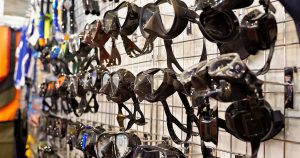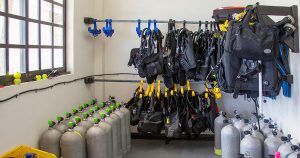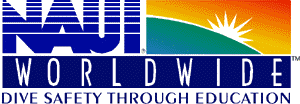Frequently Asked Questions
How can I protect my staff from COVID-19?
For employees, the general COVID-19 safety recommendations, as published by the WHO and CDC, apply. The use of protective face masks and gloves should be considered when staff members are in direct contact with clients. Reducing the number of people in certain areas or designating areas for staff members only may also be useful. Compressors, equipment maintenance areas, rental equipment areas, offices and classrooms could be temporarily off limits to clients to limit virus transmission. Encourage clients to practice social distancing and make sure they disinfect their equipment after every dive.
How can I ensure that my clients will not get COVID-19 from my facility?
While you cannot fully guarantee this, you can certainly reduce the risk by enacting preventive measures, which include but are not limited to creating and enforcing strict disinfection procedures, preventing clients from gathering or sitting too close to each other, reducing the amount of airflow in the building to a minimum (to prevent any airborne virus droplets from being circulated), and most importantly, interrogating clients before allowing them to attend a training session or dive. Clients with signs or symptoms should not be allowed to participate in any diving or related activities. Be sure to clearly post all disinfection policies to ensure that clients are aware before entering your business.
Should I request something from my clients prior to their arrival?
It takes only one infected person to spread the virus. Clients may not know they are infected, deny contact with an infected person, or assume that minor symptoms are not related to COVID-19. It is therefore important to ask if they have any indication of being unwell and encourage them to stay home or speak to a physician. You may want to consider refunding or rescheduling. You may also consider limiting visitors to only those who will be participating in diving or related activities.
What should I do when a client wants to try on a mask or other equipment?
Any mask or other equipment handled by clients should be properly disinfected, rinsed with fresh, clean water, and allowed to dry. In the case of masks specifically, alcohol or other disinfectant wipes could be used for disinfecting. It is recommended that wetsuits not be available to try on. However, if this is really necessary, they should be removed from sales stock following fitting and stored for nine days to allow the virus to die naturally.
Is COVID-19 transmissible through water? If so, does the risk vary based on type of water, i.e. swimming pools, open fresh/saltwater and rinse tanks? Will adding a disinfectant to the water be sufficient to inactivate the virus? What about adding regular hand soap to the rinse tank water?
Currently it is not known whether the new coronavirus can be transmitted in a rinse tank with communal equipment, however studies on other coronaviruses have shown that they survive well in surface water such as lakes and rivers. With this research in mind it would be prudent to assume that the virus will survive in a rinse tank and, although diluted, could remain infectious. According to the CDC the virus would be inactivated in a properly treated swimming pool, however rinsing equipment in a swimming pool is not an acceptable method of disinfection.
A disinfectant solution must be used according to the manufacturer’s directions, and these usually include specific dilution requirements and a statement instructing the user to thoroughly rinse the disinfected item and allow it to dry. Therefore, a disinfectant solution should be mixed and used separately from the freshwater rinse tank. Best practice in this case would be to have divers disinfect equipment before rinsing to avoid contamination of the rinse water. Hand soap is not a viable option for disinfecting. The U.S. Environmental Protection Agency (EPA) has a list of disinfectants that will kill the virus called “List N”; a disinfectant should be chosen from this list or from among registered disinfectants from other local governing bodies.
Can I use heat or hot water to disinfect equipment?
Theoretically, heat is an efficient way to kill the new coronavirus. However, we are unaware of any studies the have been conducted on the survivability of the virus on scuba equipment. Using heat may not be the best method of disinfecting in terms of time-effectiveness. Some studies have shown that a temperature of between 140-155 degrees Fahrenheit (60-68 degrees Celsius) will inactivate the virus after 30-60 minutes. It does not seem feasible to keep scuba equipment at this high temperature for this amount of time for a few reasons — one being that it could damage or distort some parts and another being that you would have to use a specifically designed hot water bath or constantly monitor and adjust your heating mechanism to maintain a constant water temperature for that duration.
It should be noted that quite a few studies have been conducted to determine temperatures that will kill the new coronavirus. The temperatures specified previously were selected as they are on the lower end of the spectrum tested, and they closely match with the generally accepted disinfection method in the scientific community: 60 degrees Celsius for almost one hour.
How long should I soak equipment in disinfectant to effectively kill the new coronavirus?
This is entirely dependent upon which disinfectant solution you choose For more information about selecting a disinfectant, see Disinfection of Scuba Equipment and COVID-19.
 Which disinfectant should we use, and how should it be used?
Which disinfectant should we use, and how should it be used?
The choice of disinfectant is up to you; however, you should use a product that has been proven to work against the virus that causes COVID-19. The EPA’s “List N” is made up of disinfectants that will kill the virus. Any disinfectant should be used according to manufacturer’s directions, as both concentration and contact time differ from product to product. You can find more information here.
Is 70% alcohol an effective disinfectant for scuba equipment?
According to the World Health Organization, a solution of 70% alcohol with a contact time of 1 minute would inactivate the new coronavirus, meaning that the surface must stay wet for this amount of time. However, isopropyl alcohol can degrade some types of rubber and plastic with repeated use, so to ensure you do not compromise the integrity of your equipment we recommend contacting the manufacturer for guidance. In addition, please be aware when using alcohol near any source of heat, flame, sparks or enriched gas, that it is highly volatile and flammable, presenting a significant risk of fire and explosion.
Would the use of protective gloves reduce the likelihood of materials and surfaces becoming contaminated?
The use of protective gloves will only protect the hands of the person who is wearing them. They do not protect the environment or other people present. While they might be useful for people handling materials, they do not protect materials from becoming contaminated should the virus be present on the outside of the gloves.
Can rental equipment still be rented and used?
You can continue to rent equipment, but you should take additional care, including but not limited to the following:
- Restrict access to the rental area: Bring the rented equipment out to the client.
- Disinfect returned rental equipment thoroughly according to directions on the selected disinfectant. This should include second stage regulators, BCDs, wetsuits, snorkels and masks. Rinse thoroughly with fresh water and allow to dry before renting them out again.
- Maintain a separate area for returned rental equipment to avoid contamination of equipment that has already been disinfected.
- Instruct clients not to touch the cylinder valve outlet or regulator inlet when assembling and disassembling their scuba unit. Alternatively, consider providing divers with a pre-assembled rental set and instruct them to not disassemble the set after the dive. As long as your staff work with clean hands or gloves, this will prevent contamination of the cylinder valve outlet and first stage regulator inlet.
- Instruct staff that handle used rental equipment how to properly disinfect the materials and protect themselves.
- If a client dives with you for several days, label the rental equipment so that client always gets the same equipment. The other listed recommendations still apply.
Can the new coronavirus survive inside the bladder of a BCD? What are DAN’s recommendations for oral inflation?
It is not known if the virus will survive inside the bladder of a BCD. Instruct divers not to orally inflate rental BCDs, as this increases the risk of contaminating the inside of the bladder.
If possible, consider taking rental BCDs that have been orally inflated out of service for the predicted survival time of the virus. This would reduce the risk of transmission between divers. It may also be prudent to consider mitigation measures for the release of air from the BCD (if it has been orally inflated), as the virus could theoretically be aerosolized with any water vapor that leaves the BCD as you deflate it to descend.
In terms of disinfecting the BCD, the best practice may be to thoroughly disinfect the outside of the BCD and avoid oral inflation. Recommendations for disinfecting the bladder of the BCD are unclear. The use of disinfectant solutions should always be followed by a rinse with fresh water to remove the active ingredient. This helps avoid inhalation or ingestion of the disinfectant and prevents the active ingredient from damaging equipment over time. It is unclear whether remnants of disinfectant solutions inside the BCD bladder would affect the health of a diver through inhalation or ingestion or would cause damage to the bladder material.
Should an individual mouthpiece be used for every client who rents a regulator?
If you wish to provide each diver with their own mouthpiece this will reduce some of the risk of contamination. However, exhaled air will enter the second stage and potentially contaminate the inside of the regulator. If not properly disinfected, this could cause infection of the next person to use the regulator. Proper disinfection should be used in addition to providing individual mouthpieces.
If I run my compressor, is there a chance that the compressed air inside my cylinders could be contaminated? Can the new coronavirus get into my filled cylinders?
The new coronavirus is small enough to theoretically enter the compressor without being caught by the filters. The compressor will heat the air up to well above 150 degrees Fahrenheit after each stage of compression. In addition, during each stage, the peak, instantaneous temperature due to near adiabatic heating that occurs during compression, can be at least 360 degrees Fahrenheit (182 degrees Celsius) inside the cylinder, irrespective of whether the compressor is cold or warm. This will therefore occur multiple times. These temperatures are hot enough to eliminate infectivity. Therefore, no live virus should enter a scuba cylinder during filling. It can, however, enter a cylinder if the fill whip or cylinder valve is contaminated, such as by being touched by an infected person. For this reason, it is important to practice hand washing and disinfection of high-touch areas including cylinders and fill stations. For more information, see the “Heat” section of our article Disinfection of Scuba Equipment and COVID-19.
Should I require staff and divers to use an alcohol-based hand sanitizer before filling cylinders or connecting their regulators or rebreathers to the cylinders?
The use of alcohol-based hand sanitizers is recommended only when soap and water is not available. Alcohol-based substances should not come into to contact with some equipment, including cylinders and fill whips that are used with oxygen enriched air. This would increase the risk of fire and explosion due to the high volatility of alcohol and its ability to ignite at relatively low temperatures.
What actions should I consider during dive boat operations to prevent possible COVID-19 transmission?
This situation is one in which the risk of transmission will be high due to the limited space and proximity of people. At a minimum, consider the following suggestions:
- Consider reducing the number of divers per boat to better respect social distancing, and discourage any non-diving passengers.
- Any materials not needed for the dive operations or for safety reasons should not be taken on board.
- Have all equipment on board before you start boarding the divers.
- Have scuba units assembled before divers board.
- Consider protecting masks, snorkels and second stages/mouthpieces by wrapping them in plastic bags to avoid contamination.
- Boarding procedures should be organized to respect social distancing at all times.
- Pre-dive mask rinse buckets should not be used. Anti-fog should be used, but spitting in masks should be discouraged or disallowed (especially for rental masks). Consider having divers supply their own masks instead of providing rentals.
- Staff should wear gloves when handling equipment.
- Social distancing is important to prevent the spread of a virus, but one should keep in mind that on a moving boat or in the wind, the virus may travel a longer distance. The use of protective masks will reduce the risk of contamination, but the virus can be present on any surface on board.
- Advise everyone on board to avoid touching anything where possible and to avoid touching their face.
- Remind divers not to share equipment or even let their equipment touch.
- Maintain social distancing while divers enter the water, and ensure that divers do not crowd together on the surface.
- Encourage divers to maintain at least 6 feet of distance when clearing their nose, sinuses or throat at the surface or after a dive.
- Maintain social distancing when divers get back on board.
- If your operation has chosen to provide all divers with pre-assembled equipment, the crew should change cylinders and either disinfect their hands prior or wear gloves when doing so.
- Encourage divers to handle only their own equipment.
If you would like to learn more as you prepare for resumption of diving activities when local regulations permit, keep an eye on DAN.org/COVID-19 for more comprehensive recommendations to help you prepare.


